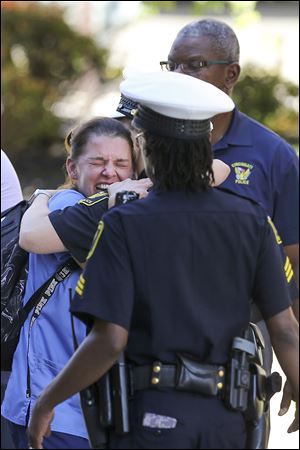
EDITORIAL
Fixing the gun problem requires conversation, empathy
9/7/2018
The recent mass shootings in Jacksonville, Fla., and Cincinnati have been a chilling reminder of America’s long-standing issue with gun violence, an issue which was seemingly inescapable at the beginning of 2018 but has, yet again, disappeared from our public discourse.
Perhaps this is because, in Jacksonville, two people were murdered before the 24-year-old perpetrator, who was reportedly angry he had been eliminated from a video game tournament, shot himself.
And in Cincinnati, a gunman opened fire in the lobby of a downtown office building, killing three before he was killed.

A woman is comforted by authorities after a shooting Thursday in downtown Cincinnati left four people dead.
What does it say about our country that we breathe a sigh of relief when the toll of a mass shooting is only two human lives? How serious is the problem when the nation barely even registers this heinous act of violence because only three people were killed?
How do we, as Americans, recapture the ability to see each of these death tolls not as a number on a screen or page, but as human beings? How can people once again see that these are innocent lives, full of potential, needlessly cut short by murderous gunmen, many of whom never should have been allowed to have a gun in the first place?
It starts with sustained conversation. The debate over solutions to gun violence must not stop after only a few weeks, as they have in recent years. No significant domestic problem has been solved without a long, robust national conversation.
The nation must also recognize that it can change and it can resolve this problem.
Few issues, if any, have ever made the American people throw up their hands in defeat. But the continued frustration over gun violence has caused people all over the country, whether they be lawmakers or average citizens, to grow numb and resigned.
But the U.S. has tackled and resolved plenty of challenging issues before. The American people did not shy away from the challenge of reforming the auto industry after Ralph Nader proved that the Corvair was “unsafe at any speed.” The incredible power and influence of the big tobacco companies was not enough to stop the country from holding them to account for the harm they had caused. The people can solve this crisis, too.
We must grapple with the reality of these events. We must talk about this scourge. And we must never forgot the trees of pain and suffering that branch from each victim — parents, siblings, and children, all of whom must now live without a loved one.
The events in Jacksonville and Cincinnati are yet another reminder that we must not allow the conversation, or our empathy, to slip away from us.